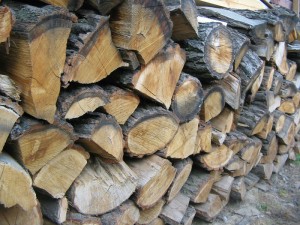The Importance of Using Seasoned Firewood
If you have a wood burning appliance, then you have more control than you probably think over the way your appliance runs. The type of wood you burn influences how efficiently your chimney runs in addition to the overall health of your chimney. It is important, then, that you choose to burn seasoned firewood. According to the National Chimney Safety Institute of America, burning seasoned firewood will allow your appliance to burn cleaner and more efficiently than burning unseasoned firewood. In fact, whether or not your firewood is seasoned is far more important than the species of wood you burn.
You may be wondering what the difference is between seasoned and unseasoned firewood as well as why this difference is important. All wood has a certain amount of water in it. Seasoned firewood has moisture content of 20 to 25 percent while unseasoned wood can have a moisture content of up to 45 percent. Burning unseasoned wood is inefficient because energy is lost to drying the wood before burning it, leading to a lower heat output. Not only this, but burning unseasoned wood also leads to more creosote build up in your chimney or stovepipe.
In order to make sure that your firewood is seasoned if you chop it yourself, cut it to length at least six months before using it. Splitting and cutting the firewood to its proper length gives the wood more exposure to the sun and wind, allowing evaporation to occur. If you buy your firewood, it is good to buy it the spring before you use it to ensure that it is well seasoned. However, if you buy your firewood close to the time you burn it there are several ways to tell if the firewood you are buying is seasoned. Check to make sure that the ends of the firewood are cracked and darkened and that the wood is light and makes a “clunking” noise when two pieces are hit together. Unseasoned firewood will be heavier.
The way you store your wood is also important to the way it will burn. If your firewood is exposed to snow and rain, it will absorb too much water to burn properly and possibly rot. Store your wood off of the ground and cover it in the case of bad weather. Leave it uncovered on sunny days to allow evaporation to occur.
When burning wood, make sure that you do not burn wood that has been painted or treated, which can cause toxic fumes to be released into your home. Also, if you end up burning unseasoned wood, it is important that you have your chimney or stovepipe frequently cleaned and inspected to avoid hazardous creosote build up.
If you are unsure about the type of wood you should be burning in your fireplace, ask an expert at Hudson Chimney during your annual chimney cleaning and inspection. The professionals at Hudson Chimney have the knowledge and training to help you determine the best choices for your chimney in order that it run efficiently and safely.

